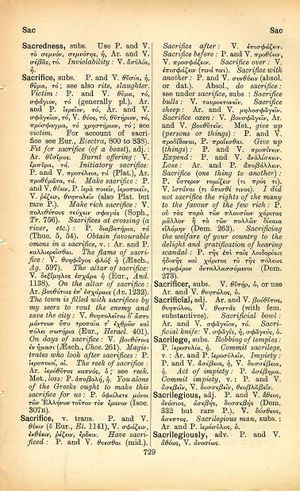sacrifice: Difference between revisions
Πολλοῖς ὁ Δαίμων, οὐ κατ' εὔνοιαν φέρων, / Μεγάλα δίδωσιν εὐτυχήματ' ... (Euripides) → God brings great good fortune to many, not out of good will,...
m (Text replacement - "<b class="b2">Tr.</b>" to "''Tr.''") |
m (Text replacement - "<b class="b2">Av.</b>" to "Av.") |
||
| Line 13: | Line 13: | ||
<b class="b2">The flame of sacrifice</b>: V. [[θυηφάγος]] [[φλόξ]] ἡ (Aesch., ''Ag.'' 597). | <b class="b2">The flame of sacrifice</b>: V. [[θυηφάγος]] [[φλόξ]] ἡ (Aesch., ''Ag.'' 597). | ||
<b class="b2">The altar of sacrifice</b>: V. [[δεξίμηλος]] ἐσχάρα ἡ (Eur., ''And.'' 1138). | <b class="b2">The altar of sacrifice</b>: V. [[δεξίμηλος]] ἐσχάρα ἡ (Eur., ''And.'' 1138). | ||
<b class="b2">On the altar of sacrifice</b>: Ar. βουθύτοις ἐπʼ ἐσχάραις ( | <b class="b2">On the altar of sacrifice</b>: Ar. βουθύτοις ἐπʼ ἐσχάραις (Av. 1232). | ||
<b class="b2">The town is filled with sacrifices by my seers to rout the enemy and the city</b>: V. θυηπολεῖται δʼ [[ἄστυ]] μάντεων ὕπο τροπαῖα τʼ ἐχθρῶν καὶ πόλει σωτήρια (Eur., ''Heracl.'' 401). | <b class="b2">The town is filled with sacrifices by my seers to rout the enemy and the city</b>: V. θυηπολεῖται δʼ [[ἄστυ]] μάντεων ὕπο τροπαῖα τʼ ἐχθρῶν καὶ πόλει σωτήρια (Eur., ''Heracl.'' 401). | ||
<b class="b2">On days of sacrifice</b>: V. βουθύτοις ἐν ἤμασι (Aesch., <b class="b2">Choe.</b> 261). | <b class="b2">On days of sacrifice</b>: V. βουθύτοις ἐν ἤμασι (Aesch., <b class="b2">Choe.</b> 261). | ||
Revision as of 10:40, 30 October 2019
English > Greek (Woodhouse)
subs.
P. and V. θυσία, ἡ, θῦμα, τό; see also rite, slaughter. Victim: P. and V. θῦμα, τό. σφάγιον, τό (generally pl.), Ar. and P. ἱερεῖον, τό, Ar. and V. σφαγεῖον, τό, V. θύος, τό, θυτήριον, τό, πρόσφαγμα, τό χρηστήριον, τό; see victim. For account of sacrifice see Eur., Electra, 800 to 838. Fit for sacrifice (of a beast), adj.: Ar. θύσιμος. Burnt offering: V. ἔμπυρα, τά. Initiatory sacrifice: P. and V. προτέλεια, τά (Plat.), Ar. προθύματα, τά. Make sacrifice: P. and V. θύειν, P. ἱερὰ ποιεῖν, ἱεροποιεῖν, V. ῥέζειν, θυηπολεῖν (also Plat. but rare P.). Make rich sacrifice: V. πολυθύτους τεύχειν σφαγάς (Soph., Tr. 756). Sacrifices at crossing (a river, etc.): P. διαβατήρια, τά (Thuc. 5, 54). Obtain favourable omens in a sacrifice, v.: Ar. and P. καλλιερεῖσθαι. The flame of sacrifice: V. θυηφάγος φλόξ ἡ (Aesch., Ag. 597). The altar of sacrifice: V. δεξίμηλος ἐσχάρα ἡ (Eur., And. 1138). On the altar of sacrifice: Ar. βουθύτοις ἐπʼ ἐσχάραις (Av. 1232). The town is filled with sacrifices by my seers to rout the enemy and the city: V. θυηπολεῖται δʼ ἄστυ μάντεων ὕπο τροπαῖα τʼ ἐχθρῶν καὶ πόλει σωτήρια (Eur., Heracl. 401). On days of sacrifice: V. βουθύτοις ἐν ἤμασι (Aesch., Choe. 261). Magistrates who look after sacrifices: P. ἱεροποιοί, οἱ. The reek of sacrifice: Ar. ἱερόθυτος καπνός, ὁ; see reek. Met., loss: P. ἀποβολή, ἡ. You alone of the Greeks ought to make this sacrifice for us: P. ὀφείλετε μόνοι τῶν Ἑλλήνων τοῦτον τὸν ἔρανον (Isoc. 307E). v. trans. P. and V. θύειν (υ Eur., El. 1141), V. σφάζειν, ἐκθύειν, ῥέζειν, ἔρδειν. Have sacrificed: P. and V. θύεσθαι (mid.). Sacrifice after: V. ἐπισφάζειν. Sacrifice before: P. and V. προθύειν, V. προσφάζειν. Sacrifice over: V. ἐπισφάζειν (τινά τινι). Sacrifice with another: P. and V. συνθύειν (absol. or dat.). Absol., do sacrifice: see under sacrifice, subs.; Sacrifice bulls: V. ταυροκτονεῖν. Sacrifice sheep: Ar. and V. μηλοσφαγεῖν. Sacrifice oxen: V. βουσφαγεῖν, Ar. and V. βουθυτεῖν. Met., give up (persons or things): P. and V. προδίδοναι, P. προΐεσθαι. Give up (things): P. and V. προπίνειν. Expend: P. and V. ἀναλίσκειν. Lose: Ar. and P. ἀποβάλλειν. Sacrifice (one thing to another): P. ὕστερον νομίζειν (τι πρός τι), V. ἱστάναι (τι ὄπισθέ τινος). I did not sacrifice the rights of the many to the favour of the few rich: P. οὐ τὰς παρὰ τῶν πλουσίων χάριτας μᾶλλον ἢ τὰ τῶν πολλῶν δίκαια εἱλόμην (Dem. 263). Sacrificing the welfare of your country to the delight and gratification of hearing scandal: P. τῆς ἐπὶ ταῖς λοιδορίαις ἡδονῆς καὶ χάριτος τὸ τῆς πόλεως συμφέρον ἀνταλλασσόμενοι (Dem. 273).

